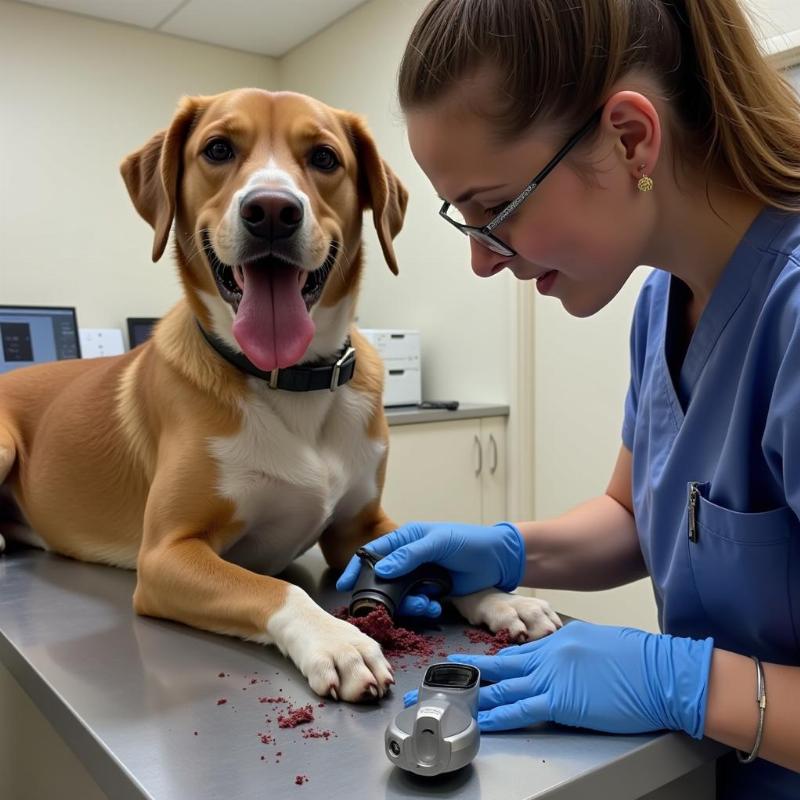A brown recluse spider bite on a dog can be a serious matter. While not all bites result in severe reactions, the venom can cause significant tissue damage, pain, and even systemic illness. Understanding the progression of a brown recluse spider bite, specifically on day two, is crucial for prompt and appropriate veterinary care. If you suspect your dog has been bitten by a brown recluse spider, seek immediate veterinary attention.
What to Expect on Day 2 of a Brown Recluse Spider Bite
Day two after a brown recluse spider bite is often when the characteristic signs become more pronounced. The initial bite may have gone unnoticed, appearing as a small red mark or pimple. However, by day two, the area will likely be more inflamed, swollen, and painful. A darker, bluish-purple center might develop, indicating tissue necrosis caused by the venom. Your dog might also exhibit signs of discomfort such as licking or biting the affected area, lethargy, and loss of appetite.
Monitoring Your Dog’s Condition
Careful monitoring is critical during this period. Keep a close eye on the wound for any changes in size, color, or discharge. Note any systemic symptoms like fever, vomiting, or difficulty breathing. Documenting these observations, including photographs, can be extremely helpful for your veterinarian.
Veterinary Treatment Options
Veterinary intervention is crucial for managing a brown recluse spider bite. Treatment options may include pain management, wound care, antibiotics to prevent secondary infection, and supportive care to address systemic symptoms. In some cases, surgery may be necessary to remove necrotic tissue.
 Veterinary Treatment for a Brown Recluse Spider Bite
Veterinary Treatment for a Brown Recluse Spider Bite
Preventing Brown Recluse Spider Bites
Prevention is always the best approach. Brown recluse spiders prefer dark, undisturbed areas like woodpiles, sheds, and closets. Regularly cleaning and decluttering these spaces can minimize the risk of encounters. Be cautious when handling stored items and inspect pet bedding frequently.
Conclusion
A day 2 brown recluse spider bite on a dog requires immediate veterinary attention. While not all bites lead to severe complications, the venom’s potential for tissue damage and systemic illness necessitates prompt and appropriate care. Monitoring, veterinary intervention, and preventative measures are essential for protecting your canine companion from the dangers of brown recluse spiders.
FAQ
-
How can I tell if my dog was bitten by a brown recluse spider? While a definitive diagnosis requires veterinary examination, a growing lesion with a dark, necrotic center, accompanied by pain and swelling, suggests a brown recluse spider bite.
-
What should I do if I suspect my dog was bitten? Contact your veterinarian immediately. Timely intervention is crucial for minimizing damage and preventing complications.
-
Are all brown recluse spider bites serious? No, not all bites result in severe reactions. However, due to the potential for serious complications, all suspected bites should be treated by a veterinarian.
-
Can a brown recluse spider bite be fatal to a dog? While rare, severe reactions, particularly in smaller dogs or those with underlying health issues, can be life-threatening.
-
How can I prevent brown recluse spider bites in my dog? Regular cleaning and decluttering of potential hiding places, cautious handling of stored items, and frequent inspection of pet bedding can significantly reduce the risk.
Introducing Beautdogs.us
Beautdogs.us is your premier online resource for all things dog-related in the US. We provide expert advice, breed-specific information, product recommendations, and valuable resources for both new and experienced dog owners. From understanding breed characteristics to navigating the complexities of dog ownership, Beautdogs.us is your trusted companion on the journey of dog parenthood. Contact us for more information at [email protected] or call us at +1 501-555-7529.